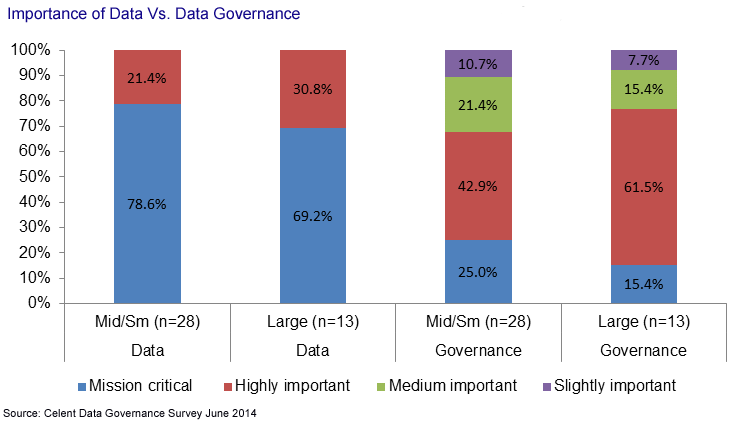The Importance of Data Governance: Current Practices
Abstract
Data initiatives abound in the insurance industry. Most carriers have some type of data initiative in place. They focus their efforts implementing reporting tools, analytic tools, and repositories —with all the tools that go with them.
As a growing number of companies start to understand the value of their data as a key business enabler, they are seriously looking into the added value of data governance. Some see it as a prerequisite for all data and information initiatives, ranging from data cleansing to the implementation of analytics.
In the report The Importance of Data Governance: Current Practices, Celent surveys carriers to understand how they view data governance, to identify the areas carriers are investing in, and assess whether these initiatives are driving value.
The majority of carriers see data as mission-critical; however, data governance is not seen as having a similar level of importance. Although more than half of the carriers report governance as mission-critical or highly important, fewer than half have formal data governance initiatives in place.
Midsize/small carriers report a greater percentage of their data is governed than large carriers. It may be that those smaller organizations find it easier to exert governance initiatives across an organization than larger carriers, which often face fragmented organizational environments with multiple data owners.
The top data challenge for carriers is collecting and analyzing data quickly enough. A fragmented data environment follows, with poor data quality the third top issue. These problems build on each other — a fragmented data environment makes it difficult to collect the data quickly, and poor data quality makes it difficult to analyze and use the data to make better decisions.
Data quality initiatives drive the most value for carriers. A data governance council also drives significant value, and many carries are getting significant value from a centralized data governance team. However, few carriers are getting value from data audits, or from having data governance metrics in place.

“Data governance is an emerging discipline in the insurance industry,” says Karlyn Carnahan, Research Director with Celent’s Insurance practice. “Those who have formal governance initiatives in place are less likely to report data quality problems. Many carriers face cultural resistance to putting formal initiatives in place, often because data is jointly owned, and the business doesn't always understand the value of data initiatives.”
This report analyzes carriers’ attitudes and practices toward data and data governance. Areas analyzed include the importance of data and data governance, the formality of data governance practices, typical ownership of data in an organization, top data challenges faced by insurance carriers, and goals for data governance, as well as which governance initiatives generate the most value. The report also looks at the amount of data which is governed, how data is shared across an organization, and the impact on common customer data. Finally the report provides thoughts for carriers as they move forward with their governance initiatives.

